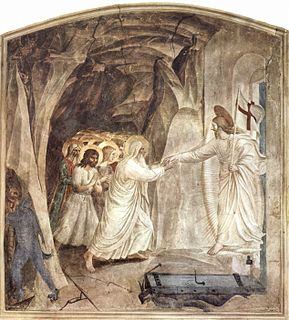Born again, or to experience the new birth, is a phrase, particularly in evangelicalism, that refers to "spiritual rebirth", or a regeneration of the human spirit. In contrast to one's physical birth, being "born again" is caused distinctly and separately by baptism in Holy Spirit, not by baptism in water. It is a core doctrine of the denominations of the Methodist, Quaker, Baptist, and Pentecostal Church along with all other evangelical Christian denominations. All of these strongly believe Jesus' words in the Gospels: "You must be born again before you can see, or enter, the Kingdom of Heaven." Their doctrine also mandates that to be both "born again" and "saved" one must have a personal and intimate relationship with Jesus Christ.
Justificatio sola fide, meaning justification by faith alone, is a Christian theological doctrine commonly held to distinguish the Reformed and the Lutheran traditions of Protestantism, among others, from the Catholic, Eastern Orthodox and Oriental Orthodox churches. The doctrine asserts that it is on the basis of faith that believers are made right of their transgressions of the law of God rather than on the basis of good works which they have done. This forgiveness is known as "justification". In classical Lutheran and Reformed theologies, good works are seen to be evidence of faith, but the good works themselves do not determine salvation. In contrast, Methodist teaching affirms a belief in justification by faith that offers God's forgiveness, but holds that holy living with the goal of Christian perfection (sanctification) is essential for salvation.

Perseverance of the saints is a Christian teaching that asserts that once a person is truly "born of God" or "regenerated" by the indwelling of the Holy Spirit, they will continue doing good works and believing in God until the end of their life.

Penance is any act or a set of actions done out of repentance for sins committed, as well as an alternate name for the Catholic, Lutheran, Eastern Orthodox, and Oriental Orthodox sacrament of Reconciliation or Confession. It also plays a part in confession among Anglicans and Methodists, in which it is a rite, as well as among other Protestants. The word penance derives from Old French and Latin paenitentia, both of which derive from the same root meaning repentance, the desire to be forgiven. Penance and repentance, similar in their derivation and original sense, have come to symbolize conflicting views of the essence of repentance, arising from the controversy as to the respective merits of "faith" and "good works". Word derivations occur in many languages.

The Westminster Confession of Faith is a Reformed confession of faith. Drawn up by the 1646 Westminster Assembly as part of the Westminster Standards to be a confession of the Church of England, it became and remains the "subordinate standard" of doctrine in the Church of Scotland and has been influential within Presbyterian churches worldwide.

Oneness Pentecostalism is a nontrinitarian religious movement within the Protestant Christian family of churches known as Pentecostalism. It derives its distinctive name from its teaching on the Godhead, which is popularly referred to as the "Oneness doctrine," a form of Modalistic Monarchianism. This doctrine states that there is one God, a singular divine spirit, who manifests himself in many ways, including as Father, Son, and Holy Spirit. This stands in sharp contrast to the doctrine of three distinct and eternal persons posited by Trinitarian theology.

In Christian theology, justification is God's righteous act of removing the condemnation, guilt, and penalty of sin, by grace, while, at the same time, declaring the unrighteous to be righteous, through faith in Christ's atoning sacrifice.
Sanctification or in its verb form, sanctify, literally means "to set apart for special use or purpose", that is, to make holy or sacred. Therefore, sanctification refers to the state or process of being set apart, i.e. "made holy", as a vessel, full of the Holy Spirit of God. The concept of sanctification is widespread among religions, including Judaism and especially Christianity. The term can be used to refer to objects which are set apart for special purposes, but the most common use within Christian theology is in reference to the change brought about by God in a believer, begun at the point of salvation and continuing throughout the life of the believer. Many forms of Christianity believe that this process will only be completed in Heaven, but some believe that complete holiness is possible in this life.
In Christian theology, baptism with the Holy Spirit, also called baptism in the Holy Spirit or baptism in the Holy Ghost, has been interpreted by different Christian denominations and traditions in a variety of ways due to differences in the doctrines of salvation and ecclesiology. It is frequently associated with incorporation into the Christian Church, the bestowal of spiritual gifts, and empowerment for Christian ministry. Spirit baptism has been variously defined as part of the sacraments of initiation into the church, as being synonymous with regeneration, as being synonymous with Christian perfection that empowers a person for Christian life and service. The term baptism with the Holy Spirit originates in the New Testament, and all Christian traditions accept it as a theological concept.

In Christianity, contrition or contriteness is repentance for sins one has committed. The remorseful person is said to be contrite.
Absolution is a traditional theological term for the forgiveness imparted by ordained Christian priests and experienced by Christian penitents. It is a universal feature of the historic churches of Christendom, although the theology and the practice of absolution vary between denominations.
Christian perfection is the name given to various teachings within Christianity that describe the process of achieving spiritual maturity or perfection. The ultimate goal of this process is union with God characterized by pure love of God and other people as well as personal holiness or sanctification. Various terms have been used to describe the concept, such as entire sanctification, perfect love, the baptism with the Holy Spirit, the indwelling of the Holy Spirit, the second blessing, and the second work of grace.
Baptism of desire is a teaching of the Anglican Communion, Lutheran Church and Roman Catholic Church explaining that those who desire baptism, but are not baptized with water through the Christian Sacrament because of death, nevertheless receive the fruits of Baptism at the moment of death if their grace of conversion included "divine and catholic faith", an internal act of perfect charity, and perfect contrition by which their soul was cleansed of all sin. Hence, the Catechism of the Catholic Church observes, "For catechumens [those instructed in the Catholic faith who are preparing to be baptized into the Catholic Church] who die before their Baptism, their explicit desire to receive it, together with repentance for their sins, and charity, assures them the salvation that they were not able to receive through the sacrament". Some traditional Catholics, including Most Holy Family Monastery, oppose the teaching or consider it a heresy because it contradicts strict interpretations of the Catholic dogma referred to as "extra Ecclesiam nulla salus."

The Confession of Faith of the Evangelical United Brethren Church is one of five established Doctrinal Standards of the United Methodist Church, along with the Articles of Religion, the General Rules of United Societies, the Standard Sermons of John Wesley, and John Wesley's Explanatory Notes on the New Testament. The United Methodist Church adopted the Confession of Faith in 1968 when the Methodist Church merged with the Evangelical United Brethren Church to form the United Methodist Church. The Confession of Faith covers much of the same ground as the Articles of Religion, but it is shorter and the language is more contemporary. The Confession of Faith also contains an article on the Judgment and Future State which had not been present in the Methodist Articles of Religion.

Conversion to Christianity is the religious conversion of a previously non-Christian person to Christianity. Different sects of Christianity may perform various different kinds of rituals or ceremonies on a convert in order to initiate them into a community of believers. The most commonly accepted ritual of conversion in Christianity is through baptism, but this is not universally accepted among Christian denominations. A period of instruction and study almost always ensues before a person is formally converted into Christianity and becomes a church member, but the length of this period varies, sometimes as short as a few weeks and possibly less, and other times, up to as long as a year or possibly more.

The New Church is any of several historically related Christian denominations that developed as a new religious group, influenced by the writings of scientist and mystic Emanuel Swedenborg (1688–1772). According to Swedenborg, he received a new revelation from Christ in visions he experienced over a period of at least twenty-five years. He predicted in his writings that God would replace the traditional Christian Church, establishing a New Church that would worship Jesus Christ as God. According to New Church doctrine, each person must cooperate in repentance, reformation, and regeneration.

The Sinner's Prayer is an evangelical Christian term referring to any prayer of repentance, prayed by individuals who feel convinced of the presence of sin in their lives and have the desire to form or renew a personal relationship with God through Jesus Christ. It is a popular prayer in evangelical circles. It is not intended as liturgical like a creed or a confiteor, but rather, is intended to be an act of initial conversion to Christianity. While some Christians see reciting the sinner's prayer as the moment defining one's salvation, others see it as a beginning step of one's lifelong faith journey.

Thomistic sacramental theology is St. Thomas Aquinas's theology of the sacraments of the Catholic Church. It can be found through his writings in the Summa contra Gentiles and in the Summa Theologiæ. As can be seen, Aquinas relied heavily on Scriptural passages, as well as the writings of various Church Fathers. St. Augustine says : "The visible sacrifice is the sacrament. This is the sacred sign of the invisible sacrifice. A thing is called a sacrament, either by having a certain hidden sanctity, and in this sense a sacrament is a sacred secret; or from having some relationship to this sanctity. A sacrament is a sign. Moreover, it is a sacred sign. Divine Wisdom provides for each thing according to its mode. Wisdom 7,1 : "she... ordered all things sweetly"; and from Matthew 25,15: "[she] gave to everyone according to his proper ability." It is a part of human nature to acquire knowledge of the intelligible from the sensible. A sign is the way one obtains knowledge of something else. The sacraments are the signs by which humans gain knowledge of spiritual and intelligible goods. Ephesians 5, 25-26: "Christ loved the Church, and delivered Himself up for it; that He might sanctify it, cleansing it by the laver of water in the word of life." St. Augustine says : "The word is added to the element, and this becomes the sacrament." Augustine : "It is impossible to keep men together in one religious denomination, whether true or false, except they be united by means of visible signs or sacraments." It is necessary for salvation that humans united together in the name of true religion. Therefore, sacraments are necessary for man's salvation. There are three reasons sacraments are necessary to the salvation of humans: First, it is in the nature of humans to be led by things corporal and sensible to things that are spiritual and intelligible. Second, by sinning, humans have subjected themselves to corporeal things. Therefore, it is proper that the remedy have a corporeal side, leading to the spiritual. Third, humans are prone to direct their activity towards material things. Sacraments are made necessary because humans have sinned. The main effect of the sacraments is grace, in particular those involving Virtues and Gifts. Grace perfects the soul and allow participation in the Divine Nature. Furthermore, the effects of the sacraments is justification. This is an interior effect. Romans 8,33: "God justifies." Therefore, the effects of the sacraments is justification. This is an interior effect. The power of the sacraments is from God, alone. It does not matter that the minister of the sacraments may be a sinner, or evil. Augustine : "He upon Whom you shall see the Spirit, ...that John did not know that our Lord, having the authority of baptizing, would keep it to Himself, but that the ministry would certainly pass to both good and evil men...What is a bad minister to you, wherever the Lord is good?"

Wesleyan theology, otherwise known as Wesleyan–Arminian theology, or Methodist theology, is a theological tradition in Protestant Christianity based upon the 18th-century evangelical reformer brothers John Wesley and Charles Wesley. More broadly it refers to the theological system inferred from the various sermons, theological treatises, letters, journals, diaries, hymns, and other spiritual writings of the Wesleys and their contemporary coadjutors such as John William Fletcher.

A sacrament is a Christian rite recognized as of particular importance and significance. There are various views on the existence and meaning of such rites. Many Christians consider the sacraments to be a visible symbol of the reality of God, as well as a channel for God's grace. Many denominations, including the Catholic, Lutheran, Anglican, Methodist, and Reformed, hold to the definition of sacrament formulated by Augustine of Hippo: an outward sign of an inward grace, that has been instituted by Jesus Christ. Sacraments signify God's grace in a way that is outwardly observable to the participant.












